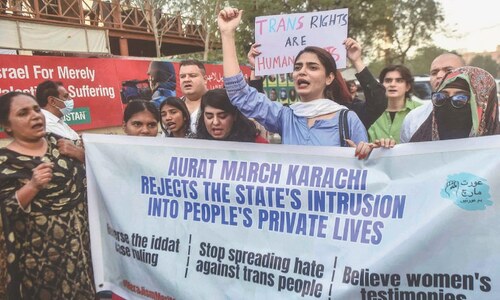THE state or powerful institutions or people within the state using the law to target individuals and social media to undermine, destabilise and delegitimise individuals, organisations and institutions they think are working against the interest of the state, the country or their own, and using brute power to suppress dissent or alternative points of view with impunity, has become much more common in recent decades and across a wide variety of settings.
This is witnessed not just in countries where institutions of democracy and law are weaker; it has been happening in more advanced countries too. In particular, the US has thrown up plenty of examples over the last decade or so.
It is true, though, that these instances are more frequent, blatant and egregious in countries with struggling democracies and justice systems. Of course, these activities undermine democracy and the rule of law and justice even more.
We have seen these activities recently, and carried out quite openly, in Pakistan. A journalist went ‘missing’ for three to four months. Everyone ‘knew’ he had been abducted but no one can name the agencies who took him away. The courts could not get him out, and police refused to ‘find’ him. When he got back, there was no inquiry about where he had been, who had taken him and what all they did to him. His physical condition clearly told us that he had not been kept in comfortable circumstances, yet, no law-enforcement or judicial institution tried to step into the space.
Is the descent into fascism inevitable? One hopes not.
On the larger issue of ‘missing persons’, everyone knows they are not missing and state agencies have even acknowledged as much in the case of some. There has been a judicial commission on ‘missing persons’ for a long time, and cases have been in courts for years. The relatives of the ‘missing’ have been protesting on the streets and on social media for years. Yet, there has been no progress.
Every now and then, a judge of a higher court makes a statement but nothing comes out of it. It is all a badly acted drama. Nobody believes that institutions have any intention or power to check the impunity of the state agencies, but the drama continues. Families continue to be devastated at the hands of the ‘state’.
Recently, we have also seen the more blatant use of legal instruments and the law to target individuals. People are arrested on the basis of trumped-up charges and FIRs so that they stay in police custody or judicial remand for weeks while they try to get bail or the fake cases quashed. But even if they succeed in getting bail in one case or if the case is thrown out by the courts, the law enforcers have them arrested under a different FIR. Sometimes, there are multiple FIRs of the same incident in different jurisdictions, allowing the police custody of the person and the ability to move them around.
If the state does not want you to be free and to move about freely or express your mind, it has plenty of ways even within the law (though not in accordance with its spirit) to ensure you no longer have the freedom or ability to enjoy the freedom of movement and expression guaranteed to every citizen in almost every constitution or structure of governance.
Then there is the role of social media, which has made it easier for the government to be able to produce and disseminate information and/ or propaganda. State machinery can question, undermine and/ or destroy the reputation of an individual or institution by producing, reproducing and disseminating information or propaganda easily.
A person or an individual institution, even large institutions, are not able to counter the kind of firepower that a state can muster in the creation and dissemination of propaganda. We have seen many examples of this of late. This can be dangerous. Social media has not only been used for hate-mongering, it has also been used for inciting hate, even violence, against individuals and institutions. Again, we have seen many examples of this.
These things are not happening in Pakistan alone. India, over recent years, gives plenty of examples of this sort of egregious state behaviour. Maria Ressa, a journalist with 40-odd years of experience in the Philippines and the region, and the recipient of the Nobel peace prize for 2021, has documented it for the Philippines in her book How to Stand Up to a Dictator (2022).
She was at the receiving end of this treatment by the state in the Philippines. She has a dozen or so cases against her, has been arrested numerous times, her news organisation has borne the brunt of the repression, and all of this for trying to be a good journalist and report truthfully against the state.
The social media campaign against her and her organisation has also made her a target, to the point where she wears a bullet-proof vest when going out in public and has had to increase security around herself and her organisation multiple times. The legal fees alone of fighting the battle with the state almost bankrupted her organisation. But this is not the only example. There are plenty of other documented cases from many countries.
What is harder to see is a way forward. How does democracy and the rule of law and institutions of justice survive this new reality? Is the descent into fascism inevitable? One hopes not.
The people have to think of new ways of organising to be able to counter the state’s new tactics. Communities have to think through how interactions among its members can be structured to ensure this abuse of the law does not happen — if the state still makes it difficult, they have to ensure that individuals and institutions have support from others in the community.
It will take time to figure this one out. But a keen awareness of the new reality is the first step.
The writer is a senior research fellow at the Institute of Development and Economic Alternatives, and an associate professor of economics at Lums.
Published in Dawn, February 16th, 2024















































Dear visitor, the comments section is undergoing an overhaul and will return soon.